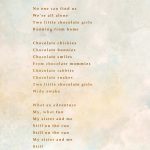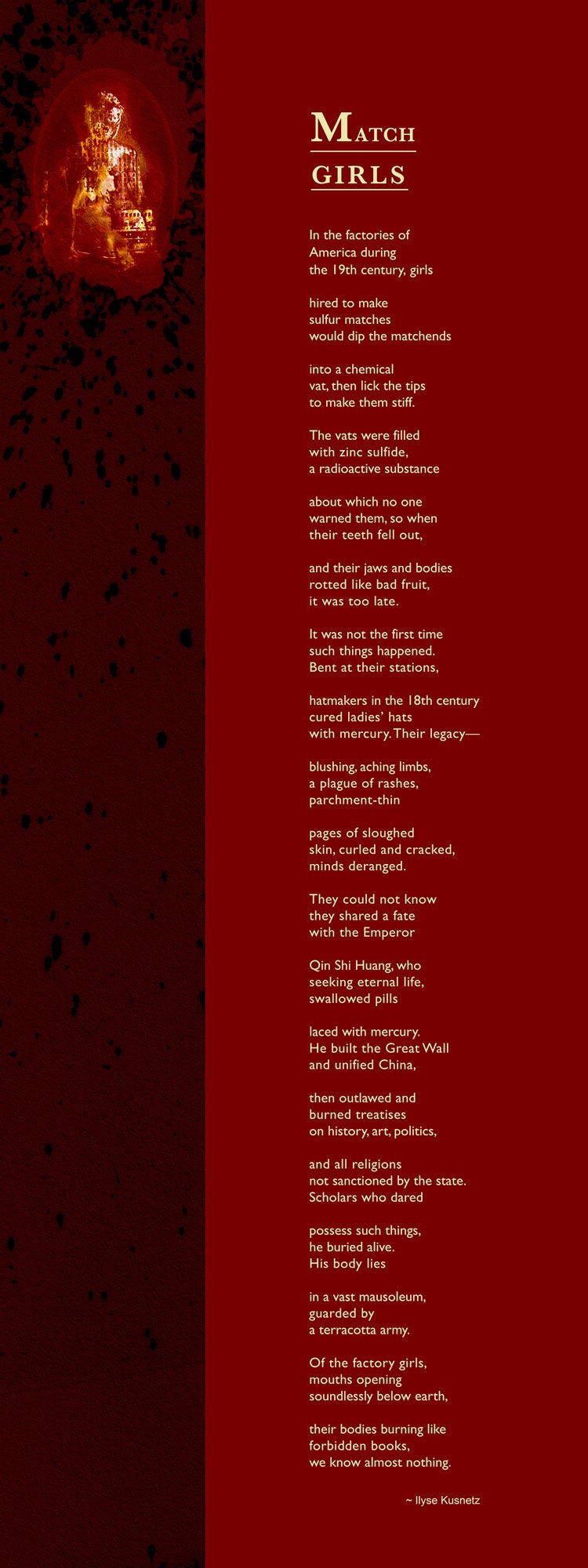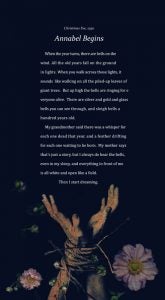Broadsides
On this page…
Ode to Gray
Has anybody written an ode to gray?
Well, if not, let me be the first. Let me praise
The charcoal pit, tweed suit, and cloudy x-ray
That reveals, to your amateur dismay,
Nothing you understand. Who has been amazed
Enough to write a breathy love song to gray and gray’s
Nearly imperceptible interplay
With other grays? O, how beautiful the haze
Of charcoal pits, tweed suits, and cloudy x-rays
Of airport luggage. I love the dog day,
The long delay, and existential malaise.
Has anybody written an ode to gray?
If not, then let me proceed without delay.
O, let me construct an army made of clay.
Marching, marching, they will be my ode to gray,
To charcoal pit, tweed suit, and cloudy x-ray.
-Sherman Alexie
My Sister and Me
Chocolate cookies
Chocolate cakes
Chocolate fudge
Chocolate lakes
Chocolate kisses
Chocolate hugs
Two little chocolate girls
In a chocolate rug
No one can find us
We’re all alone
Two little chocolate girls
Running from home
Chocolate chickies
Chocolate bunnies
Chocolate smiles
From chocolate mommies
Chocolate rabbits
Chocolate snakes
Two little chocolate girls
Wide awake
What an adventure
My, what fun
My sister and me
Still on the run
Still on the run
My sister and me
Still
On the run
-Nikki Giovanni
Match Girls
In the factories of
America during
the 19th century, girls
hired to make
sulfur matches
would dip the matchends
into a chemical
vat, then lick the tips
to make them stiff.
The vats were filled
with zinc sulfide,
a radioactive substance
about which no one
warned them, so when
their teeth fell out,
and their jaws and bodies
rotted like bad fruit,
it was too late.
It was not the first time
such things happened.
Bent at their stations,
hatmakers in the 18th century
cured ladies’ hats
with mercury. Their legacy—
blushing, aching limbs,
a plague of rashes,
parchment-thin
pages of sloughed
skin, curled and cracked,
minds deranged.
They could not know
they shared a fate
with the Emperor
Qin Shi Huang, who
seeking eternal life,
swallowed pills
laced with mercury.
He built the Great Wall
and unified China,
then outlawed and
burned treatises
on history, art, politics,
and all religions
not sanctioned by the state.
Scholars who dared
possess such things,
he buried alive.
His body lies
in a vast mausoleum,
guarded by
a terracotta army.
Of the factory girls,
mouths opening
soundlessly below earth,
their bodies burning like
forbidden books,
we know almost nothing.
-Ilyse Kusnetz
The Return
All afternoon my father drove the country roads
between Detroit and Lansing. What he was looking for
I never learned, no doubt because he never knew himself,
though he would grab any unfamiliar side road
and follow where it led past fields of tall sweet corn
in August or in winter those of frozen sheaves.
Often he’d leave the Terraplane beside the highway
to enter the stunned silence of mid-September,
his eyes cast down for a sign, the only music
his own breath or the wind tracking slowly through
the stalks or riding above the barren ground. Later
he’d come home, his dress shoes coated with dust or mud,
his long black overcoat stained or tattered
at the hem, sit wordless in his favorite chair,
his necktie loosened, and stare at nothing. At first
my brothers and I tried conversation, questions
only he could answer: Why had he gone to war?
Where did he learn Arabic? Where was his father?
I remember none of this. I read it all later,
years later as an old man, a grandfather myself,
in a journal he left my mother with little drawings
of ruined barns and telephone poles, receding
toward a future he never lived, aphorisms
from Montaigne, Juvenal, Voltaire, and perhaps a few
of his own: “He who looks for answers finds questions.”
Three times he wrote, “I was meant to be someone else,”
and went on to describe the perfumes of the damp fields.
“It all starts with seeds,” and a pencil drawing
of young apple trees he saw somewhere or else dreamed.
I inherited the book when I was almost seventy,
and with it the need to return to who we were.
In the Detroit airport I rented a Taurus;
the woman at the counter was bored or crazy:
Did I want company? she asked; she knew every road
from here to Chicago. She had a slight accent,
Dutch or German, long black hair, and one frozen eye.
I considered but decided to go alone,
determined to find what he had never found.
Slowly the autumn morning warmed; flocks of starlings
rose above the vacant fields and blotted out the sun.
I drove on until I found the grove of apple trees
heavy with fruit, and left the car, the motor running,
beside a sagging fence, and entered his life
on my own for maybe the first time. A crow welcomed
me home, the sun rode above, austere and silent,
the early afternoon was cloudless, perfect.
When the crow dragged itself off to another world,
the shade deepened slowly in pools that darkened around
the trees; for a moment everything in sight stopped.
The wind hummed in my good ear, not words exactly,
not nonsense either, nor what I spoke to myself,
just the language creation once wakened to.
I took off my hat, a mistake in the presence
of my father’s God, wiped my brow with what I had,
the back of my hand, and marveled at what was here:
nothing at all except the stubbornness of things.
-Phillip Levine
Annabel Begins
Christmas Eve, December 24, 1930
Park Ridge, Illinois
When the year turns, there are bells on the
wind. All the old years fall on the ground
in lights. When you walk across those lights, it
sounds like walking on all the piled-up leaves of
giant trees. But up high the bells are ringing for e
veryone alive. There are silver and gold and glass
bells you can see through, and sleigh bells a
hundred years old.
My grandmother said there was a whisper for
each one dead that year, and a feather drifting
for each one waiting to be born. My mother says
that’s just a story, but I always do hear the bells,
even in my sleep, and everything in front of me
is all white and open like a field.
Then I start dreaming.
-Jayne Anne Phillips
Calling
Mexico, 1969
Why not make a fiction
of the mind’s fictions? I want to say
it begins like this: the trip
a pilgrimage, my mother
kneeling at the altar of the Black Virgin,
enthralled—light streaming in
a window, the sun
at her back, holy water
in a bowl she must have touched.
What’s left is palimpsest—one memory
bleeding into another, overwriting it.
How else to explain
what remains? The sound
of water in a basin I know is white,
the sun behind her, light streaming in,
her face—
as if she were already dead—blurred
as it will become.
I want to imagine her before
the altar, rising to meet us, my father
lifting me
toward her outstretched arms.
What else to make
of the mind’s slick confabulations?
What comes back
is the sun’s dazzle on a pool’s surface,
light filtered through water
closing over my head, my mother—her body
between me and the high sun, a corona of light
around her face. Why not call it
a vision? What I know is this:
I was drowning and saw a dark Madonna;
someone pulled me through
the water’s bright ceiling
and I rose, initiate,
from one life into another.
-Natasha Tretheway






